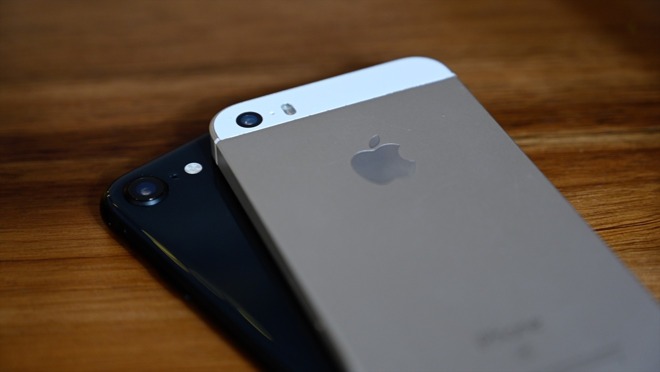iOS 15 will cut support for iPhone 6s and original iPhone SE, report claims
The next update to Apple's iOS could kill support for older devices like the iPhone 6, iPhone 6s Plus, and the original iPhone SE.

Credit: Andrew O'Hara, AppleInsider
According to the report from French site iPhoneSoft, Apple's iOS 15 update will seemingly drop support for devices with an A9 chip when it launches later in 2021. That corroborates a previous rumor about iOS 15 compatibility.
All three devices slated to lose current iOS compatibility are at least four years old. The iPhone 6s and iPhone 6s Plus were both released in September 2015, while the original iPhone SE debuted in March 2016.
In addition to the iPhones, iPhoneSoft also says a number of iPads will no longer be supported by iOS 15. Here's what may be getting left behind.
- iPhone 6s (2015)
- iPhone 6s Plus (2015)
- iPhone SE (2016)
- iPad mini 4 (2015)
- iPad Air 2 (2014)
- iPad 5 (2017)
Per iPhoneSoft, the full list of current iPhone devices that will be compatible with iOS 15 include:
- iPhone 12 mini
- iPhone 12
- iPhone 12 Pro
- iPhone 12 Pro Max
- iPhone SE (2020)
- iPhone 11 Pro Max
- iPhone 11 Pro
- iPhone 11
- iPhone XS Max
- iPhone XS
- iPhone XR
- iPhone X
- iPhone 8 Plus
- iPhone 8
- iPhone 7 Plus
- iPhone 7
The list of compatible iPads include:
- 12.9-inch iPad Pro (2015 and later)
- 11-inch iPad Pro (2018 and later)
- 10.5-inch iPad Pro
- 9.7-inch iPad Pro
- iPad Air 4
- iPad Air 3
- iPad 8
- iPad 7
- iPad 6
- iPad mini 5
Apple maintains support for older devices for several years after their release. When it does cut support, it typically does so because of hardware constraints.
The last time Apple culled the list of supported devices was with its iOS 13 update, which nixed support for the iPhone 6, iPhone 5s, six-generation iPod touch, the first-generation iPad Air, and third-generation iPad mini.
Read on AppleInsider

Comments
It’s not neural processing, that came only with the A11.
The only significant difference, aside from compute power which would make the older phones simply run not as quickly, are the low-power CPU cores.
The only way that would be of more importance for iOS 15 than for iOS 14 is if Apple plans to massively increase “always on” background processing in such a central function that without it, iOS 15 wouldn’t just be itself, where without low power cores battery life would be intolerably short.
Otherwise, I would have expected the next device culling to coincide with the requirement for neural processing, i.e. maybe iOS 16 only for A11 and later.
Similarly, the A11 is the first CPU with an Apple-designed GPU, which would make it another reason for a natural next-generation cut-off.
So I hope Apple keeps supporting these A9 devices, which are otherwise modern in terms of mass storage controller, etc. until A11 is the base requirement for reasons listed above.
They still do as evidenced by your 6S running iOS14. Whether it makes the cut to iOS 15 is yet to be seen.
I’m unsurprised iPhone 6s is getting dropped. I’m still running iOS 12.x on mine because of how many reports of slowdowns and bugs (and the expectation of bugs still NOT fixed, such as bugs I’ve reported repeatedly every major revision that doesn’t fix them, some starting back at iOS 7!!!) in iOS 13 & 14, especially for this phone.
I’ll probably be forced into buying a new phone in a year or two just because of the inability to use stuff that requires iOS 14+. It’s annoying that the two camera features I find desirable in Apple iPhones over the last ten years has only just appeared (raw images, which I assume means literally raw, and not screwed with by processing we cannot turn off which makes every photo look crystallized in order to hide low ISO noise, which I’d rather see instead), and the other is only available on the big-ass version of the “pro” phone I don’t want to spend all my money on.
I’ll probably also be forced to buy a new iPad Pro just to keep up with iOS music apps, when they inevitably abandon the first 12.9” model, probably at a version of iOS that cripples it, performance-wise, which cannot be undone, so it’s basically gambling when you make the decision to “upgrade” or not...
I’ve been with the computer industry since age 14. I’m REALLY TIRED of this perpetual hamster wheel of built-in obsolescence. I’ve lately been playing around with the same computers that were around when I was 14. They’re less capable, but they’re also inherently less complicated, quicker to start and shut off, more predictable, and almost entirely consistent (except for part failures, and it’s remarkable that 30-year-old computers still work, and even have a small market of new retro tech and replacement parts made available by clever hobbyists).